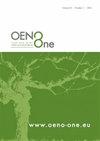Effects of biodynamic preparations 500 and 501 on vine and berry physiology, pedology and the soil microbiome
IF 2.2
3区 农林科学
Q3 FOOD SCIENCE & TECHNOLOGY
引用次数: 0
Abstract
In the pursuit of increasing sustainability, climate change resiliency and independence of synthetic pesticides in agriculture, the interest of consumers and producers in organic and biodynamic farming has been steadily increasing in recent decennia. This is, in particular, the case for the vitivinicultural industry in Europe, where more and more producers are converting from organic to biodynamic farming. However, clear scientific evidence showing that biodynamic farming improves vine physiology, vine stress resilience, soil quality related parameters and berry or wine quality is still lacking, despite the growing number of research studies on this issue. To investigate whether biodynamic farming methods have an impact on vine physiology, berry quality and the environment, a five-year experiment was set up in 2016 in a commercial vineyard in Switzerland. In this trial, the two main biodynamic preparations 500 and 501 were applied and compared to an organic control. Vine and berry physiology (net photosynthesis, vigour, sugar, organic acids, berry weight, yield) were assessed from 2016 to 2020. Soil physical properties (soil bulk density, water holding capacity, soil structural stability, macropore volume) were analysed from 2017-2020, and, soil fungal communities were analysed by DNA-sequencing in the last year of the experiment (2020). None of the parameters related to vine and berry physiology showed significant differences throughout the duration of the experiments, except photosynthesis, which was higher when biodynamic preparations were applied at one time point. Similarly, the soil’s physical properties were not influenced by the application of the two biodynamic preparations in all years. Regarding the soil microbiome, the preparations 500 and 501 neither led to significant differences in fungal diversity nor seemed to impact the soil fungal communities. The present study confirms previous findings of different research teams that did not observe significant differences between organic and biodynamic farming methods in terms of observed soil and vine parameters.生物动力制剂500和501对葡萄和浆果生理、土壤学和土壤微生物组的影响
为了提高农业中合成农药的可持续性、应对气候变化的能力和独立性,近十年来,消费者和生产者对有机和生物动力农业的兴趣一直在稳步增加。欧洲的葡萄种植业尤其如此,那里越来越多的生产商正在从有机农业转向生物动力农业。然而,尽管对这一问题的研究越来越多,但仍然缺乏明确的科学证据表明,生物动力农业可以改善葡萄生理、葡萄抗逆性、土壤质量相关参数以及浆果或葡萄酒质量。为了调查生物动力耕作方法是否会对葡萄生理、浆果质量和环境产生影响,2016年在瑞士的一个商业葡萄园进行了一项为期五年的实验。在该试验中,应用两种主要的生物动力学制剂500和501,并与有机对照进行比较。从2016年到2020年,对葡萄和浆果的生理学(净光合作用、活力、糖、有机酸、浆果重量和产量)进行了评估。2017-2020年分析了土壤物理性质(土壤容重、持水能力、土壤结构稳定性、大孔体积),并在实验的最后一年(2020年)通过DNA测序分析了土壤真菌群落。在整个实验期间,与葡萄和浆果生理学相关的参数都没有显示出显著差异,除了光合作用,当在一个时间点应用生物动力制剂时,光合作用更高。同样,土壤的物理性质在所有年份都没有受到这两种生物动力制剂应用的影响。关于土壤微生物组,制剂500和501既没有导致真菌多样性的显著差异,也似乎没有影响土壤真菌群落。本研究证实了不同研究团队先前的发现,即在观察到的土壤和葡萄藤参数方面,有机和生物动力耕作方法之间没有观察到显著差异。
本文章由计算机程序翻译,如有差异,请以英文原文为准。
求助全文
约1分钟内获得全文
求助全文
来源期刊

OENO One
Agricultural and Biological Sciences-Food Science
CiteScore
4.40
自引率
13.80%
发文量
85
审稿时长
13 weeks
期刊介绍:
OENO One is a peer-reviewed journal that publishes original research, reviews, mini-reviews, short communications, perspectives and spotlights in the areas of viticulture, grapevine physiology, genomics and genetics, oenology, winemaking technology and processes, wine chemistry and quality, analytical chemistry, microbiology, sensory and consumer sciences, safety and health. OENO One belongs to the International Viticulture and Enology Society - IVES, an academic association dedicated to viticulture and enology.
 求助内容:
求助内容: 应助结果提醒方式:
应助结果提醒方式:


